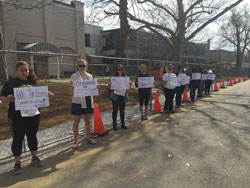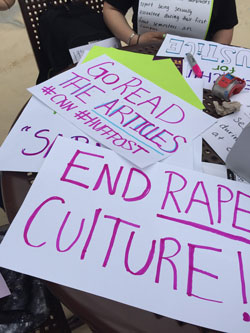Approximately 25-30 students gathered on the student center patio for a non-violent protest on March 10 to bring awareness to Title IX and to recent reports from multiple media outlets that the University has been named in a Title IX violation. The protest lasted from 9:30 a.m. to 7 p.m.
Students from the clubs CommWorks, SAGE (Students Advocating Girls Education), gender studies, sociology, and political science departments, and Greek organizations came together and organized the protest, which was covered by News 12 New Jersey. This was not a gathering of just student run organizations as there were students present at the protest who just wanted to support the movement. They made signs that said “End Rape Culture” and “Know Your IX”.
“As a sociologist, I understand how important it is to act collectively to solve social problems, so I was really heartened to see students moving beyond individual approaches to confronting the national issue of campus sexual violence,” said Dr. Johanna Foster, assistant professor of sociology. “One of our most important tasks as a university is to facilitate a climate of critical thinking and engagement in participatory democracy among our students, so I think the protests are a sign that our intellectual community is becoming increasingly informed and vibrant- which I think is a great thing.”
“I think this protest was important because it’s our way of showing the university that they made a mistake and now it’s time to own up to it,” said Asia Byrd, a junior communication student and President of CommWorks. “This campus runs as a public and there are rules we as students must follow, but they’re also rules our administration has to follow as well. This action level taken on this students case was not properly handled and this our way of saying ‘you can’t do that.’”
Byrd, who helped organize the protest, thought the event was a success. “All of us were out there as concerned students and even though we are asking for answers, the main goal is educating others in the campus community about Title IX and our rights as students. Hopefully, our message reached out to ‘Sarah’ and anyone else that finds their self in this situation,” said Byrd.
 Janaya Lewinski, a junior political science student and Vice President of SAGE, attended the protest. “I found it important to protest because I wanted to start a conversation about Title IX,” she said. “This (Monmouth) is everyone’s home, and people should know what rights they are entitled to upon arrival, and we should be able to have a conversation about it in public spaces. This campus should be safe for everyone, including people who have been the victims of sexual assault. The fact that it may not be is truly unsettling, and I just wanted my voice heard about the issue.”
Janaya Lewinski, a junior political science student and Vice President of SAGE, attended the protest. “I found it important to protest because I wanted to start a conversation about Title IX,” she said. “This (Monmouth) is everyone’s home, and people should know what rights they are entitled to upon arrival, and we should be able to have a conversation about it in public spaces. This campus should be safe for everyone, including people who have been the victims of sexual assault. The fact that it may not be is truly unsettling, and I just wanted my voice heard about the issue.”
“I applaud the rights of students to gather and to protest in a nonviolent way,” said Dr. Schmelzkopf, associate professor of history and anthropology. “This is an important part of what it means to be a student and a citizen. As for the University, we need to remember that the students arethe essence of the University.”
Lisa Dinella, associate professor of psychology, also supported the nonviolent student protests. “I hope that the protests on campus send a message of support to all sexual assault victims. I think the protests showed that students are engaged in making our campus community safer and more equal for all. Sexual assault is a complex topic, and efforts to eradicate sexual assault can come from lots of individuals and different groups on campus. Monmouth University is a vibrant learning community, and I hope we see even more education efforts on how best support survivors, and how to stop sexual assaults from happening,” she said.
These protests took place as a response to reports from the official website of End Rape on Campus (EROC), CNN, and Huffington Post, that a woman, who wishes to remain anonymous and is using the name ‘Sarah’, has filed a complaint with the U.S. Department of Education against Monmouth University for violating Title IX and mishandling a sexual assault case.
Title IX is defined by Dr. Datta Rekha, a professor of political science and sociology, as “…a federal regulation that prohibits sex-based discrimination in education. It also addresses sexual harassment and sexual violence.”
Title IX is also defined by EROC as a federal civil rights law that prohibits discrimination on the basis of sex in any education program or activity that receives federal funding, this includes sexual harassment, sexual battery, sexual assault, and rape.
This student was one of four college students to come forward, all from different universities, claiming their school did not handle their sexual assault case appropriately. These schools included American University, the University of Alabama at Birmingham, Indiana University Bloomington, and Monmouth University.
However, the University claims they were not contacted by the Office of Civil Rights regarding the matter. “There are several news reports alleging a Title IX violation, however, Monmouth University has no record of the referenced complaint being filed with the Office of Civil Rights,” said Tara Peters, Associate Vice President of University Marketing and Communication. “If and when we are notified of such a complaint, we are fully prepared to work with the Office of Civil Rights, which would have jurisdiction in this type of matter,” Peters continued.
“My sense is that somehow or another, an advocacy group has picked up on this and reported on it to the media before the office of civil rights reacted to it or sent it to each individual campus,” said Mary Anne Nagy, Vice President for Student Life and Leadership. “We heard about it via the media as opposed to hearing about it through the Office of Civil Rights the week of March 6-12.”
“The safety of our University community is a top priority,” said President Paul Brown, PhD. “Although the University has not been notified of a Title IX complaint, we can still use this as an opportunity to reexamine our practices. As soon as I was made aware of this allegation, I made a decision to retain impartial outside counsel to help us to reevaluate all of our practices in this area. We have rigorous processes in place to handle these matters, but if there is an opportunity for us to improve our processes, I want to ensure that happens.”
“We don’t know what actually did or did not occur,” said Schmelzkopf. “However, any student who reports sexual abuse should be supported, have his or her right to freedom of speech respected, and never be the one held responsible for avoiding contact with the accused.”
Foster offered insight regarding ways to prevent rape and sexual assault on campus. “One key thing we can do as a culture is to move our focus off of efforts that try to teach students how to avoid being victims of rape and sexual assault, and instead talk openly about how we can prevent students from being perpetrators of violence in the first place.”
According to the Cleveland Rape Crisis Center, “1 in 4 college women will be the victim of sexual assault during her academic career; … Survivors of rape or sexual assault are four times more likely to be victimized by someone they know than by a stranger...” Rekha said that bringing awareness to these numbers is also key to showing the importance of the issue on college campuses.
Rekha also offered insight on the ways to prevent this type of situation on campus. She explained that awareness to resources for these victims is key. “Perhaps we need to raise more awareness of the problem, and of the tools, policies, and administrative units that students can reach out to.”
There are places for students to go at the University if they have been raped or sexually assaulted. “Rape and sexual assault are not misunderstandings; they are crimes. Students who have been raped or sexual assaulted should call the MU police,” said Foster. “They can also call the Office of Equity and Diversity, and they can also go directly to the MU Office of Counseling and Psychological Services.”
The Outlook will work to keep the University community informed with news on the case and situation.
PHOTO COURTESY of Danielle Schipani
PHOTO COURTESY of Asia Byrd



